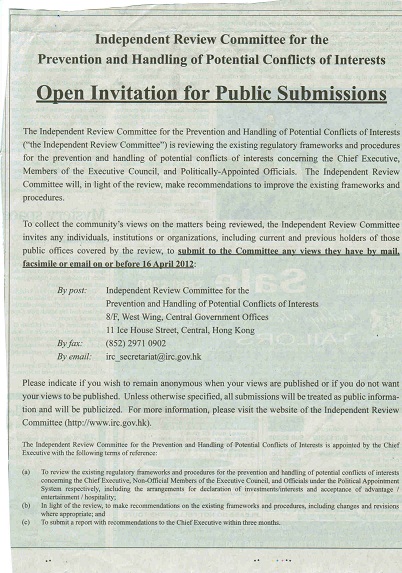Download PDF : Guidelines for implementation FCTC 9789241501316_eng
March 29th, 2012:
Idle enforcers of engine law
SCMP
Predictably, enforcement of the idling-engines law is proving to be farcical. It has come to our ears that security trucks belonging to Guardforce and G4S are in the habit of lurking on Tung Hei Road, Shau Kei Wan , from its junction with Shau Kei Wan Main Street East to the traffic lights some 200 metres down the road underneath the flyover. This is an area with a number of schools. The drivers sit around eating, sleeping chatting meanwhile, keeping their engines running. So a complaint was made by Clear the Air chairman James Middleton to the Environmental Protection Department, which is supposed to enforce the new law.
Back came a letter from the EPD to say it had had indeed found trucks with idling engines at this location. “Our observation was that they were providing armoured transportation services,” writes Ray Leung of the EPD, adding that they were therefore exempt under the law. It is hard to see what armoured protection services they were providing parked under a flyover.
Middleton’s response to the EPD: “Your response is not acceptable and is a dereliction of duty. They are most certainly not actively ‘engaged in armoured transportation services…they are having lunch, reading newspaper and sleeping. Therefore the exemption does not apply during these activities.”
Our reporter tells us that as a result of the EPD’s enquiries, security vehicles no longer congregate at this location. They have moved and now gather around the Factory Street playground spewing their emissions. Yet another success story for Edward Yau Tang-wah, secretary for the environment.
Waste levy will not deter rich citizens
SCMP
Friends of the Earth has proposed that the cost of disposing of refuse under any government waste charge scheme should be HK$1.30 a bag. It estimates that a typical family would pay HK$40 a month.
The purpose of the waste charging scheme is to reduce the amount of solid waste generated in Hong Kong, as this is causing problems for our landfills, which are nearing capacity.
The proposed charge may appear to be the solution to the problem, but I do not think it would be a fair levy.
Everyone will have to pay the same flat rate and this will do little to deter people on high incomes. The average cost of HK$40 means nothing to them and it will not encourage them to generate less refuse.
It would also be of no consequence to organisations that are huge polluters.
However, it will be a financial burden for families on low incomes.
That amount would be the cost of a typical meal for them. I am sure all of us want to see a reduction in the volume of solid waste that Hong Kong creates. Surely, those people who are the worst polluters should pay a higher levy.
Hong Kong is very much a money-minded society.
We need a scheme that gives people an economic inducement to cut back on the waste they produce.
I am also concerned that unless a better scheme is introduced, we will actually see an increase in cases of illegal dumping of solid waste in Hong Kong.
This is obviously a serious issue which must be addressed effectively.
I hope that the government can come up with a better policy to deal with the environmental problems being caused by the levels of waste presently generated in Hong Kong.
Lai Sin-yi, Sha Tin
Third runway lobby ignoring serious environmental impact of growth
29 March 2012 – SCMP
Exco’s approval of a third runway at Chek Lap Kok coincided with the release of a scientific paper showing increases in global atmospheric temperatures since 1998 to have been much higher than projected once Arctic measurements are included.
This reflects a more rapid, unprecedented and ongoing increase in average global temperatures than at any time in the past 20 million years. The only plausible explanatory model we have for this increase is human economic activity. In the report (“Fuel prices may burn airline earnings, says Iata”, March 21) rising aviation fuel costs are mentioned as problematic in a declining market where they cannot be passed on to travellers.
The cost of the third runway will be passed on to travellers, but in a declining market rising costs will further drive down demand. The illusion of continuous growth blinds many to this problem. Moreover, a third runway will do nothing to relieve crowding in the airspace over the Pearl River estuary. A third runway to “maintain competitiveness” reflects a mistaken naivety of thought we can no longer afford.
Many readers may have missed the Organisation for Economic Co-operation and Development’s latest dire warnings of climate-related harm (“Future living standards ‘may already be doomed”’, March 17). Instead the broken record of “economic and population growth” will be constantly replayed by the baby-boomer generation and a compliant media, while the young will be left to deal with the looming ecological consequences.
Though the evidence for anthropogenic climate change is stronger than that for Iranian nuclear weapons, we will continue to focus on the latter, while making excuses not to consider the former.
After all, nothing can hamper economic growth – can it?
Richard Fielding, deputy director (advocacy), school of public health, University of Hong Kong
